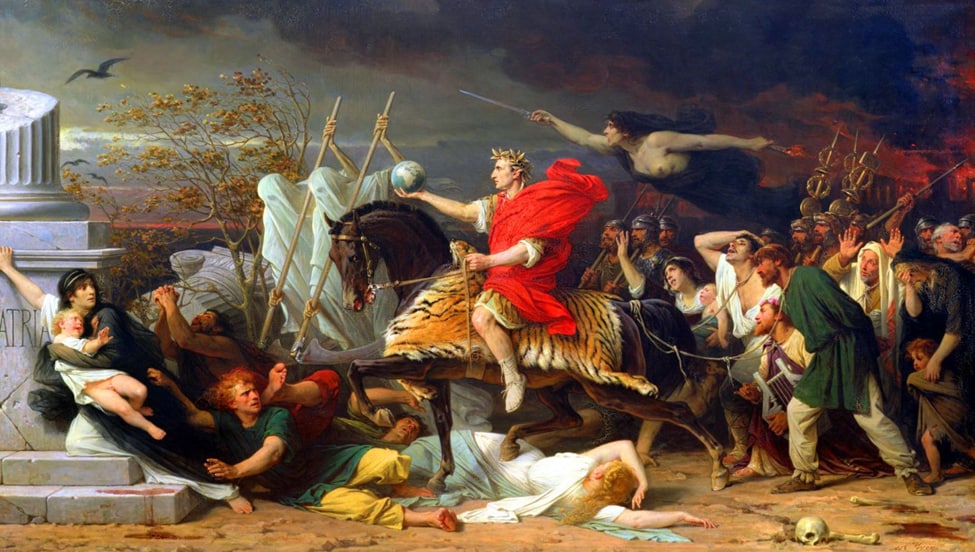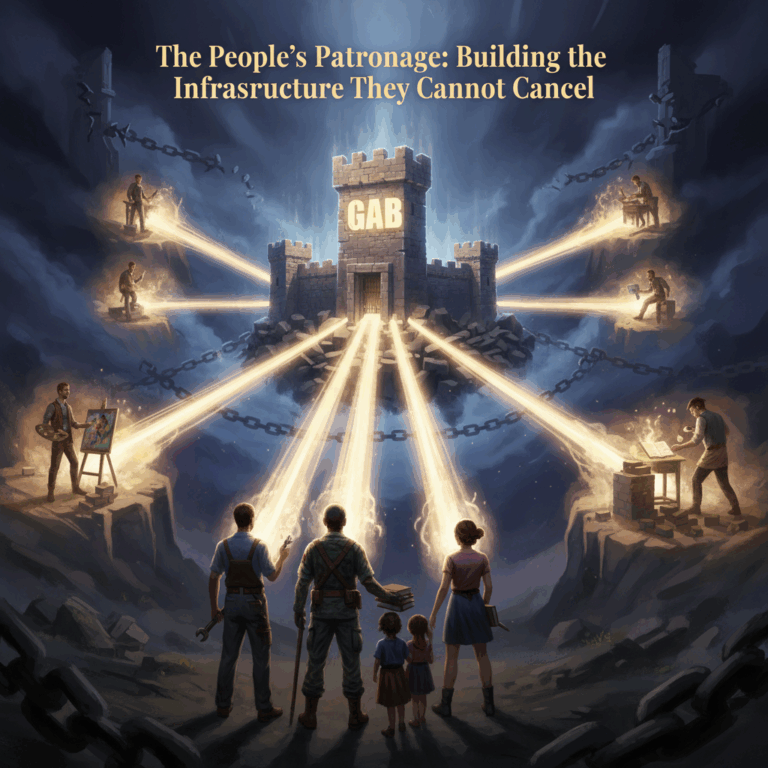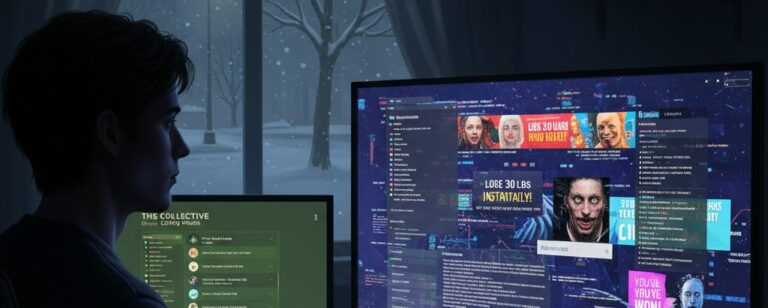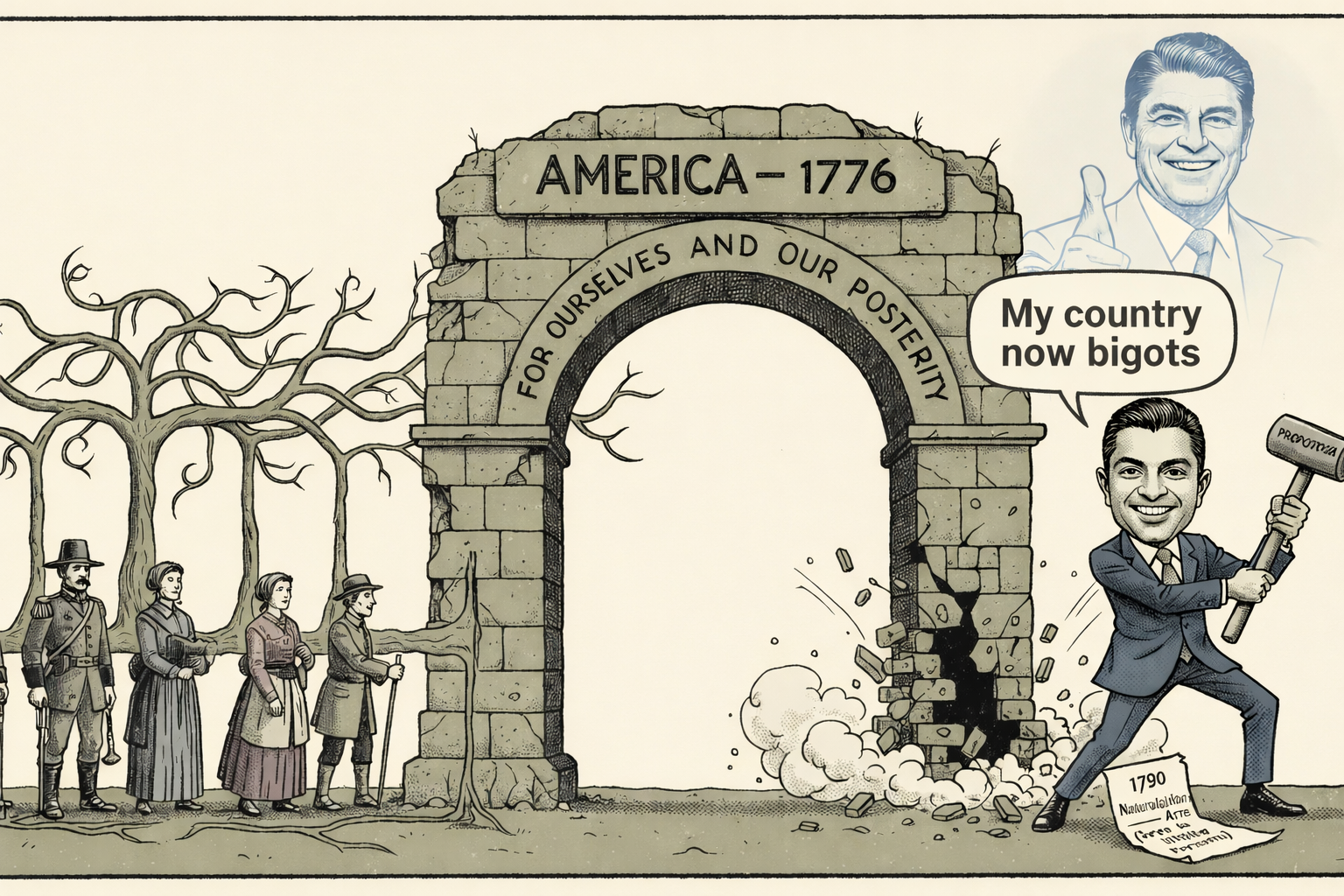by ThinkingWest
The word “democracy” appears exactly zero times in the United States Constitution. And yet, no form of government is celebrated with the same fervency as democracy. Recently, the phrase “Our Democracy” has been co-opted by nearly every politician as an attempt to appeal to the populace’s supposedly unshakeable faith in the voting process. Appeals to the fragility of “Our Democracy” are commonly made by political figures hoping to discredit rivals; rivals they unhesitatingly accuse of threatening that ancient Athenian inheritance. A keen extraterrestrial might conclude that many of the developed nations of the world embrace democracy as religion.
But is this unquestioning reverence for a form of political governance healthy, reasonable, desirable? Does such reverence blind us to the shortcomings that democracy may possess relative to other political arrangements and lure us into complacent, even dangerous, self-satisfaction?
Let’s review a few of the major issues that beset democracies. The aim is not to condemn democracy as a form of governance, but to critique it such that we may be better informed of its imperfections. After all, politics of any form must involve human beings and human beings, despite their best intentions, are far from perfect.
1.) Democracy is only as Noble and Reasonable as its Voting Citizens
The first critique of democracy concerns the responsibility that citizens have to exhibit character in daily life and to stay well informed about the issues for which they vote. It does not matter how passionately a citizen may feel about a particular issue; if that passion is not tempered by objective investigation and the application of reason to the issue at hand, the voter abdicates a central responsibility as a citizen. No degree of passion is a substitute for clear-headed thinking. Understanding well the tendency that democratic citizens have towards this failure, Winston Churchill once quipped, “The best argument against democracy is a five-minute conversation with the average voter.” Unfortunately, many citizens of modern democracies fall prey to emotional pleas and assume that heartfelt emotion is sufficient to guide ones voting decisions. The media, with that oh-so-dangerous self-satisfaction, appeals to the smug assuredness of over-confident voters through emotionally manipulative means. The voters are constantly reassured that their viewpoint is the only reasonable one.
Democracy has yet to find a solution to the Dunning-Kruger effect, the phenomenon where the less a person knows about an issue, the more confident a person is in their knowledge about the issue. A 2018 study by Ian G Anson published in the journal Political Psychology investigated how the Dunning-Kruger effect affects citizens’ perceptions of their political knowledge. Anson examined over two thousand American adults via two online surveys which quizzed the participants on basic political knowledge. Most participants of the study performed poorly and those who performed poorest were more likely to be confident in their knowledge of politics than those that performed well 1.
The Dunning-Kruger effect, combined with patronizing and pandering from politicians and the press, results in a poorly informed, but highly opinionated public. A hyper-emotional public is incapable of cool-headed, rational debate and is, instead, prone to political provocation and manipulation by media and power-hungry politicians.
A successful democracy requires citizens to continuously revisit and revise their understanding of core issues in a level-headed manner. Such revision is best embarked upon with temperance and reason.
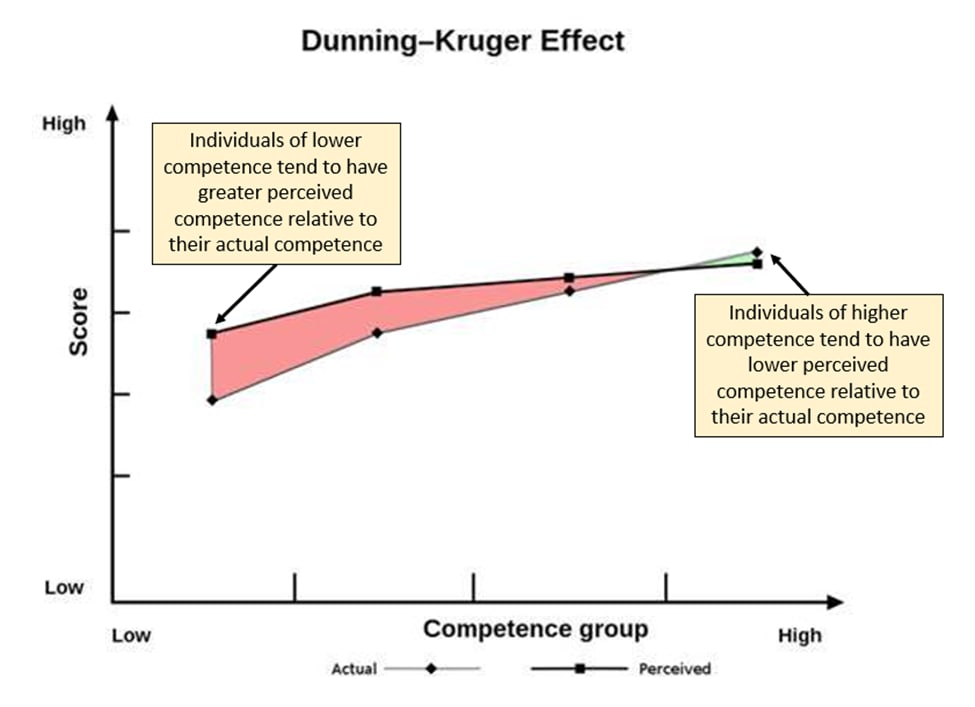
2.) Democracy Makes Neighbors Political Adversaries and Makes All Issues Political
A less considered shortcoming is the tendency for democracies to create adversity between citizens who hold differing political opinions. In the United States, this adversity has become so intense between Republicans and Democrats that distrust between members of opposing parties extends far beyond just political issues. Nearly every issue brought to the public eye, whether science, sports, movies, or music becomes irreversibly burdened with political interpretation, intention, and influence. Ideas and concerns submitted by one side of the political aisle are a priori rejected and condemned by the other side before the slightest consideration of the idea’s merits. This effect may be particularly amplified in a democratic political system where there are only two major parties. Then, nearly every political issue inherits a kind of adversity that is more likely to be absent when the number of available choices exceeds two.
The recent COVID-19 pandemic emphasizes the need to be aware of the tendency people have to view apolitical issues through partisan lenses. As thoughtful citizens we should be cognizant of this tendency when evaluating actions to take to solve these issues. A June 2020 article from FiveThirtyEight detailed the divergence of experiences between Republicans and Democrats during that time2. Republicans generally exhibited less concern about the pandemic while Democrats exhibited greater concern about it. The intent of this article is not to determine which political party was correct or incorrect about the pandemic, but to demonstrate how partisan politics played a crucial role in shaping people’s viewpoints about a major issue. One would presume that the pandemic should never have been a political issue. Instead, the pandemic and its mitigation efforts should have been matters of public health and science.
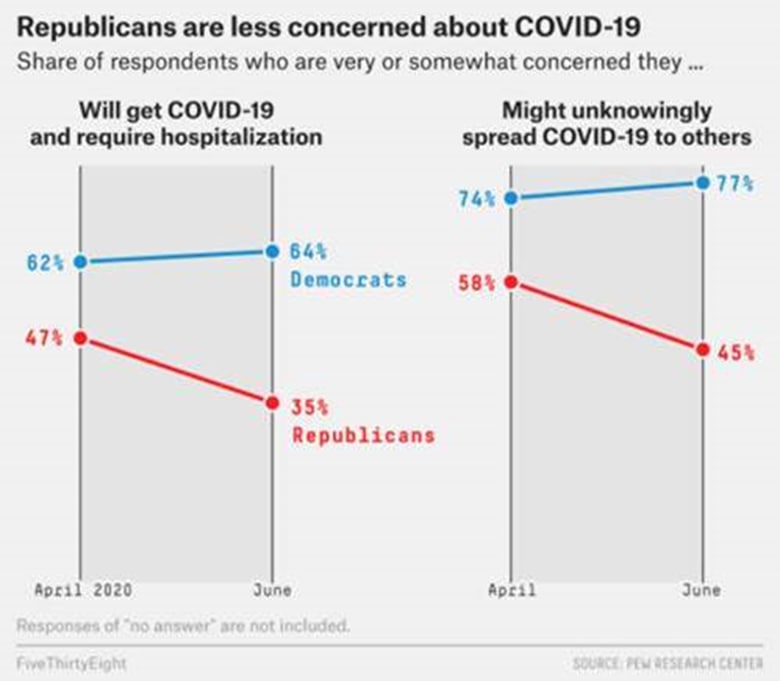
Ideally, an open scientific investigation and discussion should have been facilitated to find the best solutions to counter the pandemic while maintaining the minimum possible obstruction of freedoms upon citizens. Instead, political parties championed separate causes and blamed the opposition for any and all Covid-19 deaths. This turned the opposing party into literal “murderers” while one’s own party used these deaths to lobby for votes.
This is not to say that there were no valid issues that were brought up during the political chaos. Examples of valid points of disagreement included masking policies, vaccination mandates, lockdowns, and experimental drug treatments. However, actual open scientific debate on these issues was rarely carried out.
The COVID-19 pandemic response is just one example of where the political divide contaminates problem-solving and leads to further distrust between those that share different political opinions. As the political divide in America (and across the West) widens, more and more aspects of society become political, from sports to music to education. Nearly every aspect of life now contains political undertones, which only divides us further and makes cordial political dialogue near impossible. The U.S.’s current circumstance stands as an example of the tendency for democracies to politicize everything and divide its citizenry.
3.) Democracies Incur Great Opportunity Costs
Another drawback of modern democracy is the immense opportunity cost incurred by political campaigns. Time, money, energy, and attention are all consumed by political parties vying to ensure that their candidate is elected. Dozens, hundreds, and sometimes even thousands of people are employed for hours, days, and weeks to assist with a campaign on behalf of a candidate. And consider the fact that in a two-party system, one of these parties’ efforts will effectively be for nothing if it loses. Not only are political campaigns expensive, but they are also getting increasingly MORE expensive. In 2016 the total cost for presidential and congressional races was $7 billion. By 2020 that number doubled to more than $14.4 billion3.
Let’s consider what alternative investments could be made with $14.4 billion. For $400,000 each, $14.4 billion could buy 36,000 homes. Researchers from 23 countries suggest that $14 billion is the additional expenditure needed each year to eradicate world hunger by 2030. The National Cancer Institute estimates that the average cost of first-year cancer treatment is $42,000 4. At this price tag, $14 billion is enough to purchase a year’s worth of cancer treatment for over 330,000 people. Clearly, the extraordinary sums of money spent on political campaigns could be used for a variety of beneficial endeavors. These endeavors could have lasting, meaningful effects on the lives of countless people.
In addition to the monetary cost of campaigning, political involvement incurs a devastating mental toll on losers of election races. Regarding the 2016 presidential election, analysis suggests that in states that voted for Hillary Clinton in November 2016, there were a total of 54.6 million more days of poor mental health than in October 2016 5. Poor mental health leads to lower quality of life and lower productivity. Though poor mental health isn’t exclusive to democracies, it is a heavy opportunity cause to risk the mental health of half the country each election cycle. This problem is particularly strong in winner-take-all elections as in presidential races.
Another significant cost in democracies is the time and energy the politicians spent on campaigning and fundraising for the next election cycle. Not only must politicians work to enact new legislation, but they must also devote considerable resources to ensuring they maintain popular public opinion and are prepared financially for their upcoming reelection campaign. This diverts time, energy, and attention from passing legislation to lobbying voters and campaign donors. According to Rep. Rick Nolan in “60 Minutes” expose from CBS, members of Congress are encouraged to spend thirty hours per week in call centers for their respective parties asking for donations:
Rep. Rick Nolan: “Thirty hours is what they tell you you should spend. And it’s discouraging good people from running for public office. I could give you names of people who’ve said, “You know, I’d like to go to Washington and help fix problems, but I don’t want to go to Washington and become a mid-level telemarketer, dialing for dollars, for crying out loud.”
Interviewer: “You’re saying members of Congress are becoming like telemarketers?”
Rep. Rick Nolan: “Well, 30 hours a week, that’s a lot of telemarketing. Probably more than most telemarketers do.”
This emphasis on fundraising also results in fewer good people running for office according to Nolan – another opportunity cost of the current democratic process. 6
While political engagement is necessary for a functioning democracy, this engagement can incur a heavy cost on the people it purportedly serves. Current democracies risk turning politics into an industry unto itself. When the democratic process becomes an industry unto itself, it ceases to act on behalf of the people and instead serves the political actors.
4) Democracy is Expensive and Politicians Push Costs to Future Generations
The fourth flaw of democracy is the tendency for democracies to become more expensive over time as citizens vote for additional benefits from the government. Once a benefit is provided to citizens they will rarely vote to remove this benefit, especially when it is financed through tax dollars. This is particularly true when the benefit has been provided for several generations. Over time, this leads wealthy societies to become more dependent on the government to provide for the citizenry. Alexander Fraser Tytler, an influential professor of universal history in the 18th century and an expert on the rise and fall of civilizations summarized this tendency:
“A democracy cannot exist as a permanent form of government. It can only exist until the voters discover that they can vote themselves largesse from the public treasury. From that moment on, the majority always votes for the candidates promising the most benefits from the public treasury with the result that a democracy always collapses over loose fiscal policy, always followed by a dictatorship. The average age of the world’s greatest civilizations has been 200 years. These nations have progressed through this sequence: From bondage to spiritual faith; From spiritual faith to great courage; From courage to liberty; From liberty to abundance; From abundance to selfishness; From selfishness to apathy; From apathy to dependence; From dependence back into bondage.” 7
-Alexander Fraser Tytler
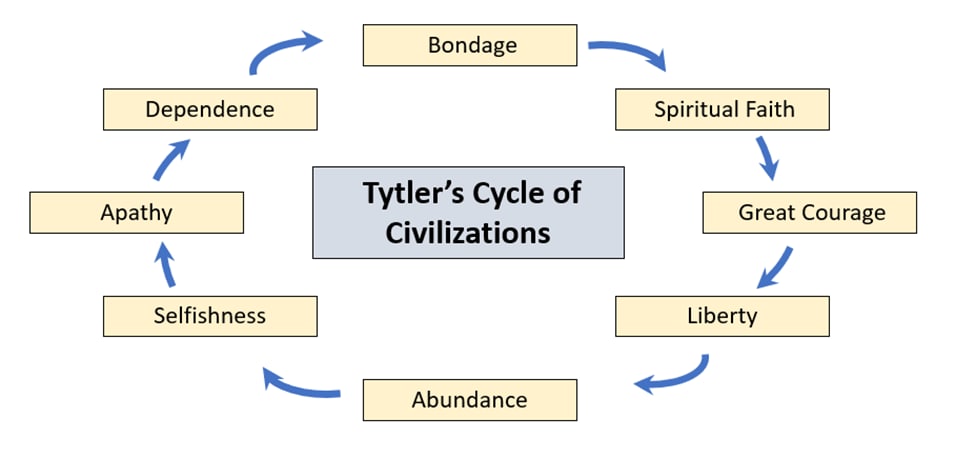
Tytler suggests that civilizations emerge out of hardship through great faith and courage. This struggle ultimately leads to liberty and abundance in which citizens are largely free to act as they see fit. But while desirable in their own right, liberty and abundance lead to selfishness and apathy when not tempered by discipline. Finally, when in a state of material wealth, a civilization returns to a state of dependence in which the citizenry chooses welfare and handouts over personal responsibility. This allows tyrants to exploit complacent citizens through false promises which leads to the final stage, the stage that defines most of human political history: bondage. Aristotle formulates Tytler’s cycle succinctly:
“Inevitably, masculine republics give way to feminine democracies, and feminine democracies invariably give way to tyranny.”
-Aristotle
And the prolific historian Will Durant summarized this phenomenon even more simply:
“A civilization is born Stoic and dies Epicurean.”
-Will Durant
This trend toward dependence is evident in the amount of debt a democratic nation accrues. Consider that nine of the ten most indebted nations are considered democracies by the World Population Review 8,9. Only the tiny Asian nation of Bhutan (considered a “hybrid regime”) is not considered either a flawed or full democracy. The graph below demonstrates that democracies are particularly prone to spending beyond their means. Debt is money borrowed from future generations to pay for the expenses of the current generation. By voting themselves benefit after benefit, citizens vote themselves into being financial liabilities. These liabilities are expected to be paid for by future generations, creating an unsustainable financial trajectory. As we have seen from Tytler’s cycle of civilizations, this unstable financial path can then be exploited by opportunists willing to bribe citizens with additional benefits in exchange for their freedom. This results in a reduction of liberty and prosperity in society.
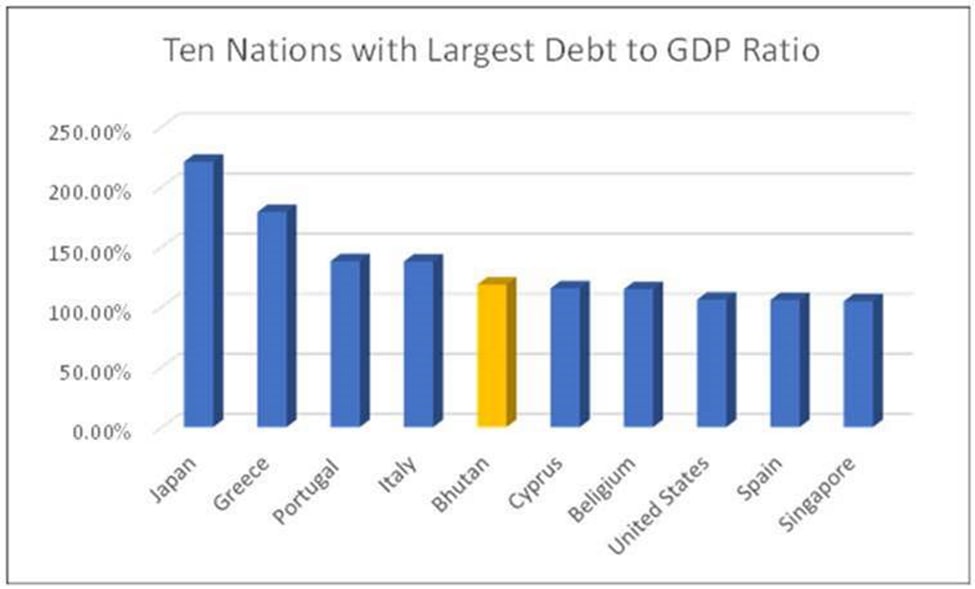
The politicians who make grand promises to their constituents rarely pay the cost incurred by said promises. Instead, future generations foot the bill for policies that were often passed simply to gain temporary public approval. Sly politicians prey upon the shortsightedness and emotionality of voting citizens, ultimately buying votes with hard-earned capital from future generations.
Conclusion
In conclusion, democracies come with flaws like all forms of government. Democracy’s tendency to reflect the vices of their citizenry and pit citizens against each other means that democratic nations should focus on the education and ethics of their populaces. Consequently, their voters can make informed and moral choices when selecting elected leaders. The high opportunity cost of political campaigns and the propensity for democracies to accrue large amounts of debt is also a serious flaw in democratic governments. Laws that limit campaign contributions and government spending constraints could mitigate these issues, though this is easier said than done. Voters and representatives alike will need to be cognizant of future generations when considering any increase in government benefits.
Overall, no form of government is perfect. It can be trendy to ridicule democratic government given the current state of the western world. However, let us refrain from unreflective and reckless criticism. Perhaps Winston Churchill’s wise assessment of the system is most appropriate:
“Democracy is the worst form of government, except for all the others.”
-Winston Churchill
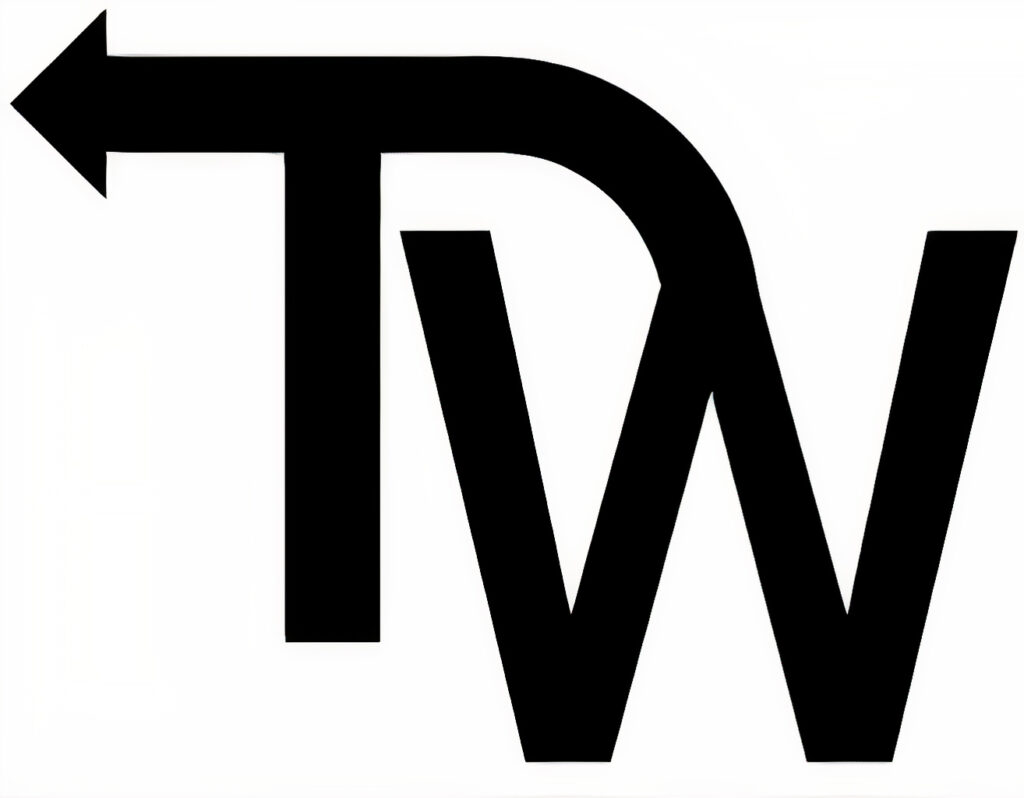
Thinking West aims to revive the “Great Conversation” in our digital age through promoting the study of the great books of the western world, classical approaches to education, and through thoughtful commentary on current events, history, philosophy, culture, education, and religion.
We strive first and foremost to spark an appreciation for the values that built the West. Our content strives for depth and meaning in an era plagued by six second attention spans and clickbait headlines. We challenge ourselves and our readers to read, reflect, and speak out on ideas that matter.
Footnotes:
[1] https://onlinelibrary.wiley.com/doi/abs/10.1111/pops.12490
[3] https://www.opensecrets.org/news/2021/02/2020-cycle-cost-14p4-billion-doubling-16/
[6] https://www.cbsnews.com/news/60-minutes-are-members-of-congress-becoming-telemarketers/
[7] https://www.goodreads.com/quotes/108530-a-democracy-cannot-exist-as-a-permanent-form-of-government
[8] https://worldpopulationreview.com/country-rankings/democracy-countries
[9] https://www.stash.com/learn/10-countries-with-largest-national-debt-to-gdp/


